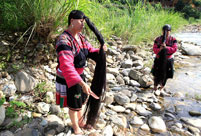

A totem pole with African art
There is a garden at Qiubin Primary School, somewhere in the quiet suburb of Jinhua, in China’s eastern province of Zhejiang. The garden is not a repository of plant species but African cultural heritage.
This area, surrounded by the school’s gleaming classrooms and administration blocks, has come to be known as the ‘Dynamic African Park.’
At the park’s entrance are two pillars shaped in form of a hut, a primitive dwelling still in existence in some parts of Africa. Sculptures of wild animals including an elephant, zebra, tiger and lion dot around the park. There is even a replica of the Pyramids of Giza.
The pyramids of Gizza recreated at the African garden of Quibin Primary School
During a tour of the attractive park, one of the pupils explains with meticulous detail the average size, weight and lifespan of an African elephant, even though she has not yet seen one in real life.
The park, also known to pupils as the ‘Vigorous African Garden, is an almanac of African culture, music and fine art, where young Chinese students get up-close with the way of life of African people.
Students are taught almost everything, from playing African musical instruments to creating handicrafts and clothing lines with African designs.
The African Park at Quibin was set up with the backing of Zhejiang Normal University, which itself introduced an institute of African studies devoted to the study of African culture.
Professor Liu Hongwu, an expert on African studies and dean of the African Institute at Zhejiang Normal University says the park will promote china-Africa relations outside formal structures.
“A group of children who have fallen in love with African culture will be the bond of China-Africa non-governmental communication,” Liu told visiting African journalists on a recent visit to the school.
The African garden is one the experimental efforts to expose young Chinese students to the unique elements of African culture.
Jianhua Quibin Primary School
Quibin Primary School has been promoting student exchanges and last year hosted groups of student leaders from 13 English-speaking African primary and secondary schools.
With about 1,600 students, the school embraces a multi-cultural mode of learning, considering that most of the students are children of migrant workers from other provinces of China.
Love for Africa
“I deeply love vigorous African garden because there are all kinds of animals, which I have never seen,” Huang Zhiyong, a pupil in Class 4 is quoted in one of the school’s publications.
Another student, Hu Lianwen is eager to travel to Africa after learning about a few aspects of African culture and being told there are lovely beaches on the continent.
The students at the school have a different outlook about African people and have a much better understanding of different cultures.
Playing drums
“For some Africans, if their skin is a little white, they would be like us. If my skin is darker, I am also like an African,” one of the students is reported to have told her teachers at the school.
“African people are enthusiastic and civilised. We, Chinese people, are shy but Africans will say hello even to a stranger,” another student is quoted to have stated according to a publication.
Liu is confident such initiatives will have a profound effect on China’s understanding and relations with the rest of the world in decades to come.
China is poised to be the biggest economy in the world in one or two decades. Liu concurs that the toughest test for China will be her sensibility and tolerance to different cultures and races.
He maintains that a strong China will need her children to have a ‘healthy, happy, open and inclusive spiritual world.’
The African Park was set up with funding worth 1.7 million yuan ($260,000) from Zhejiang Normal University, the first institution in China to set up a research centre devoted to African studies.
Art pieces made by pupils of Quibin Primary School
Who is Liu Hongwu?
Liu, one of the inspirations and backers of the school, studied at the University of Lagos in Nigeria and Dares salaam University in Tanzania.
He has been in charge of several research projects sponsored by the national social science fund. He is a recipient of the China-Africa Friendship Award, as one of the ten Chinese who moved African people.
Professor Liu believes understanding African culture is important not just for improving communication but also out of shared history of civilisation.
“Africa is not only one of the cradles of civilisation but also a rising continent,” he explains, noting that the two civilisations can learn from one another.
Taddeo Bwambale is a journalist working with the New Vision newspaper in Uganda, a fellow at the China-Africa Press Center and an intern at People's Daily Online. He can be contacted on taddeonyondo@yahoo.com
 |
 World's fastest bullet train to start operating next month
World's fastest bullet train to start operating next month Huangluo: China's 'long hair village'
Huangluo: China's 'long hair village' Spectacular bridge with one of the tallest piers in the world
Spectacular bridge with one of the tallest piers in the world Magnificent view of Hukou Waterfall
Magnificent view of Hukou Waterfall A glimpse of Stride 2016 Zhurihe B military drill
A glimpse of Stride 2016 Zhurihe B military drill US Navy chief tours Liaoning aircraft carrier
US Navy chief tours Liaoning aircraft carrier Chinese American woman wins Miss Michigan
Chinese American woman wins Miss Michigan Centenarian couple takes first wedding photos
Centenarian couple takes first wedding photos Traditional Tibetan costumes presented during fashion show
Traditional Tibetan costumes presented during fashion show Top 10 livable Chinese cities
Top 10 livable Chinese cities Top 20 hottest women in the world in 2014
Top 20 hottest women in the world in 2014 Top 10 hardest languages to learn
Top 10 hardest languages to learn China’s Top 10 Unique Bridges, Highways and Roads
China’s Top 10 Unique Bridges, Highways and Roads Foreigners get a taste of Chinese officialdom in villages
Foreigners get a taste of Chinese officialdom in villages Painful divorce shouldn’t be public fodder
Painful divorce shouldn’t be public fodder Online broadcasting proves to be lucrative
Online broadcasting proves to be lucrative Chinese filmmakers are losing touch with audiences, is there a turning point ahead?
Chinese filmmakers are losing touch with audiences, is there a turning point ahead?Day|Week